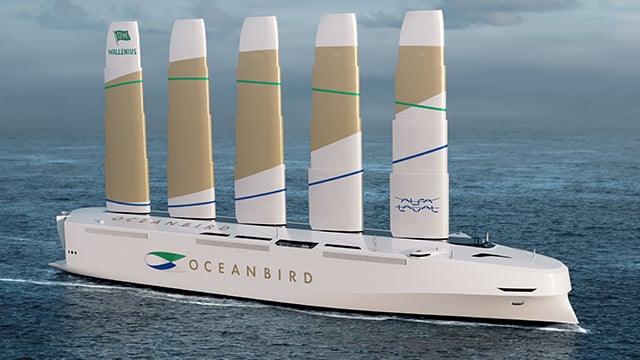Alfa Laval and Wallenius agree on a joint venture to develop modern wind propulsion
With an aim to radically reduce the marine industry’s carbon footprint and overall emissions, Alfa Laval and Wallenius have announced their intent to form a new 50/50joint venture. AlfaWall Oceanbird will focus on the development and realization of technology for fully wind-powered vessel propulsion.
Sailing away from fossil fuels
Alfa Laval and Wallenius are familiar partners in developing ground-breaking technology. The companies have collaborated previously on PureBallast, which is one of today’s leading solutions for ballast water treatment. Through AlfaWall Oceanbird, they will pursue an innovative means of wind propulsion based on telescopic wing sails. This solution could reduce emissions by 90% on the largest ocean-going vessels.
“Wind has a key role to play in decarbonizing the marine industry,” says Peter Nielsen, Business Unit President, Alfa Laval Marine Division. “Together with Wallenius, we will harness this abundant natural force to meet both climate needs and those of maritime business.”
“Oceanbird wing sail technology will be not only an elegant solution, but also a powerful driver of positive change,” says Per Tunell, COO Wallenius Marine and future Managing Director of AlfaWall Oceanbird. “Our vision at Wallenius is to lead the way towards truly sustainable shipping, and we are proud to partner with Alfa Laval in reaching it.”
Putting wings on the water
Though designed for wind propulsion, the Oceanbird technology has more in common with modern planes than traditional sailing vessels. It comprises an array of rigid wing sails, built from steel and composite materials, that generate forward movement instead of vertical lift. These wing sails will be able to turn 360° to make optimal use of the wind.
The technology will be valid for any vessel type, but it will be implemented first on a transatlantic car carrier. Able to carry 7,000 cars, the vessel will be 200 metres long and will cross the Atlantic in 12 days when sailing at an average speed of 10 knots. AlfaWall Oceanbird will focus primarily on the vessel’s technical sailing aspects, such as the vessel control system that will steer the wing sail operation.
“The wing sails are up to 80 metres tall and have a telescopic construction,” says Nielsen. “Besides adjusting to catch the wind, they can be lowered to pass under bridges, to handle harsh weather conditions or for maintenance. Because they will interact with the hull in a sophisticated way, they will also require intelligent control.”
Returning to wind as a way forward
The AlfaWall Oceanbird joint venture comes at a critical point for the marine industry, which is responsible for around 2–3% of global greenhouse gas emissions. With the intent of reducing greenhouse gases related to shipping by at least 50% by 2050 compared to 2008 levels, IMO has set a goal to cut CO2 emissions from international shipping by 40% by 2030. Alfa Laval and Wallenius are committing to decarbonization targets beyond these levels, as are many other companies and a range of countries.
“We cannot wait until the end of the century to phase out fossil fuels,” says Tunell. “We must create realistic alternatives, including the infrastructure for delivering and supporting them. Wallenius is committed to wind propulsion, and we know from the experience with PureBallast that Alfa Laval can help us make it a global reality.”
“Alfa Laval has supported the marine industry’s evolution for more than 100 years, but today there is new urgency,” says Nielsen. “Wallenius shares our environmental momentum and the determination to find immediate, workable solutions. Having once helped us explore our planet, wind can now help us rescue it.”
To learn more about the wing sail technology and AlfaWall Oceanbird’s approach to wind
propulsion, please visit www.theoceanbird.com
Editor’s notes
This is Alfa Laval
Alfa Laval is active in the areas of Energy, Marine, and Food & Water, offering its expertise, products, and service to a wide range of industries in some 100 countries. The company is committed to optimizing processes, creating responsible growth, and driving progress – always going the extra mile to support customers in achieving their business goals and sustainability targets.
Alfa Laval’s innovative technologies are dedicated to purifying, refining, and reusing materials, promoting more responsible use of natural resources. They contribute to improved energy efficiency and heat recovery, better water treatment, and reduced emissions. Thereby, Alfa Laval is not only accelerating success for its customers, but also for people and the planet. Making the world better, every day. It’s all about Advancing better™.
Alfa Laval has 16,700 employees. Annual sales in 2020 were SEK 41.5 billion (approx. EUR 4 billion). The company is listed on Nasdaq OMX.
This is Wallenius
Wallenius, with headquarter in Stockholm, has been a frontrunner in the global shipping industry since 1934. The company offers a complete and sustainable shipping service – from innovative design and newbuilding to ship management.
Wallenius was an early adopter of a zero-emissions target in shipping. With a long-term perspective and an integrated way of working, operational feedback is used to enhance performance and optimize the design of next generation of vessels. As a result, Wallenius designs high efficiency vessels with minimum fuel consumption. The vision is to lead the way towards truly sustainable shipping.
Wallenius developed the Oceanbird concept in co-operation with KTH and SSPA in the wPCC (wind Powered Car-Carrier) project. The project is active during 2019-2022 and is supported by the Swedish Transport Administration.

